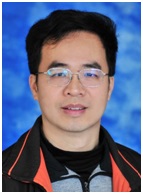题目:Generalized Eigenvalue Decomposition Processors for Leakage-Based MIMO Precoding
时间:2017年11月09日上午10:00
地点:四牌楼校区 李文正楼 北512会议室
演讲人:Prof. Yuan-Hao Huang (National Tsing-Hua University)
Generalized Eigenvalue Decomposition Processors
for Leakage-Based MIMO Precoding
Abstract:
Multi-user multiple-input-multiple-output (MU-MIMO) precoding is known to be an effective transmission scheme to achieve very high spectral efficiency in modern wireless communication systems. While there have been a variety of multiuser precoder designs proposed over the last decades, the signal-to-leakage-and-noise (SLNR)-based precoder is known to achieve very nice performance-complexity tradeoffs. The leakage-based precoding algorithm supports the MU-MIMO system for multiple users with multiple antennas to increase the diversity and throughput at the user ends compared to single-antenna users. Generalized eigenvalue decomposition (GEVD) processing dominates the overall complexity in an SLNR-based precoder because it has many matrix inversion operations. This talk will present several GEVD processor designs that can avoid the matrix inversion operations by different matrix processing approaches. The algorithms, architectures, and IC synthesis results of these GEVD processor will be presented, compared and discussed in this talk.
Biography
 Yuan-Hao Huang received the B.S. and Ph.D. degrees in Electrical Engineering from National Taiwan University, Taipei, Taiwan, R.O.C., in 1995 and 2001, respectively. His Ph.D. study focused on the design and implementation of communication digital signal processor for wireless communications. Then, Dr. Huang was the technical faculty with VXIS Technology Corp., Hsinchu, Taiwan from 2001 to 2005, when he and his team developed TV demodulation IC for both analog (NTSC/PAL) and digital (DVB-T) television broadcasting systems. Since 2005, he has been with the Department of Electrical Engineering and the Institute of Communications Engineering, National Tsing-Hua University, Taiwan, where he is currently a professor.
Yuan-Hao Huang received the B.S. and Ph.D. degrees in Electrical Engineering from National Taiwan University, Taipei, Taiwan, R.O.C., in 1995 and 2001, respectively. His Ph.D. study focused on the design and implementation of communication digital signal processor for wireless communications. Then, Dr. Huang was the technical faculty with VXIS Technology Corp., Hsinchu, Taiwan from 2001 to 2005, when he and his team developed TV demodulation IC for both analog (NTSC/PAL) and digital (DVB-T) television broadcasting systems. Since 2005, he has been with the Department of Electrical Engineering and the Institute of Communications Engineering, National Tsing-Hua University, Taiwan, where he is currently a professor.
Dr. Huang’s research interests include communication baseband signal processing, VLSI design for DSP systems and communication systems, and biomedical signal processing. He has published 24 journal papers and 55 conference papers. The published journal papers are in IEEE Transactions on Speech and Audio Processing, IEEE Journal of Solid-State Circuits, IEEE Trans. on Circuits and Systems-I, IEEE Trans. on Circuits and Systems-II, IEEE Trans. on VLSI Systems. IEEE Trans. on Signal Processing, IEEE Trans. On Biomedical Circuits and Systems and other IEEE transactions and letters. He also owns five U.S patents, six Taiwan patents, and 11 technical contributions in the IEEE802.16m standard.
Dr. Huang is currently an advisory board member of Design and Implementation of Signal Processing Systems Technical Committee (DiSPS TC) of IEEE Signal Processing Society since 2016/1. He is also an appointed committee member of Seasonal School Subcommittee of Membership Board of IEEE Signal Processing Society since 2016/1, and an Editorial Member of IEEE Signal Processing Resource Center. He served as a TC member in DiSPS TC of IEEE Signal Processing from 2010 to 2015, and has been serving as a TC member in VSA and GN TCs of IEEE Circuits and Systems Society since 2010. He also served in technical committees of many well-known conferences including IEEE ISCAS, IEEE ICASSP, IEEE SiPS, IEEE APCCAS, and etc.

